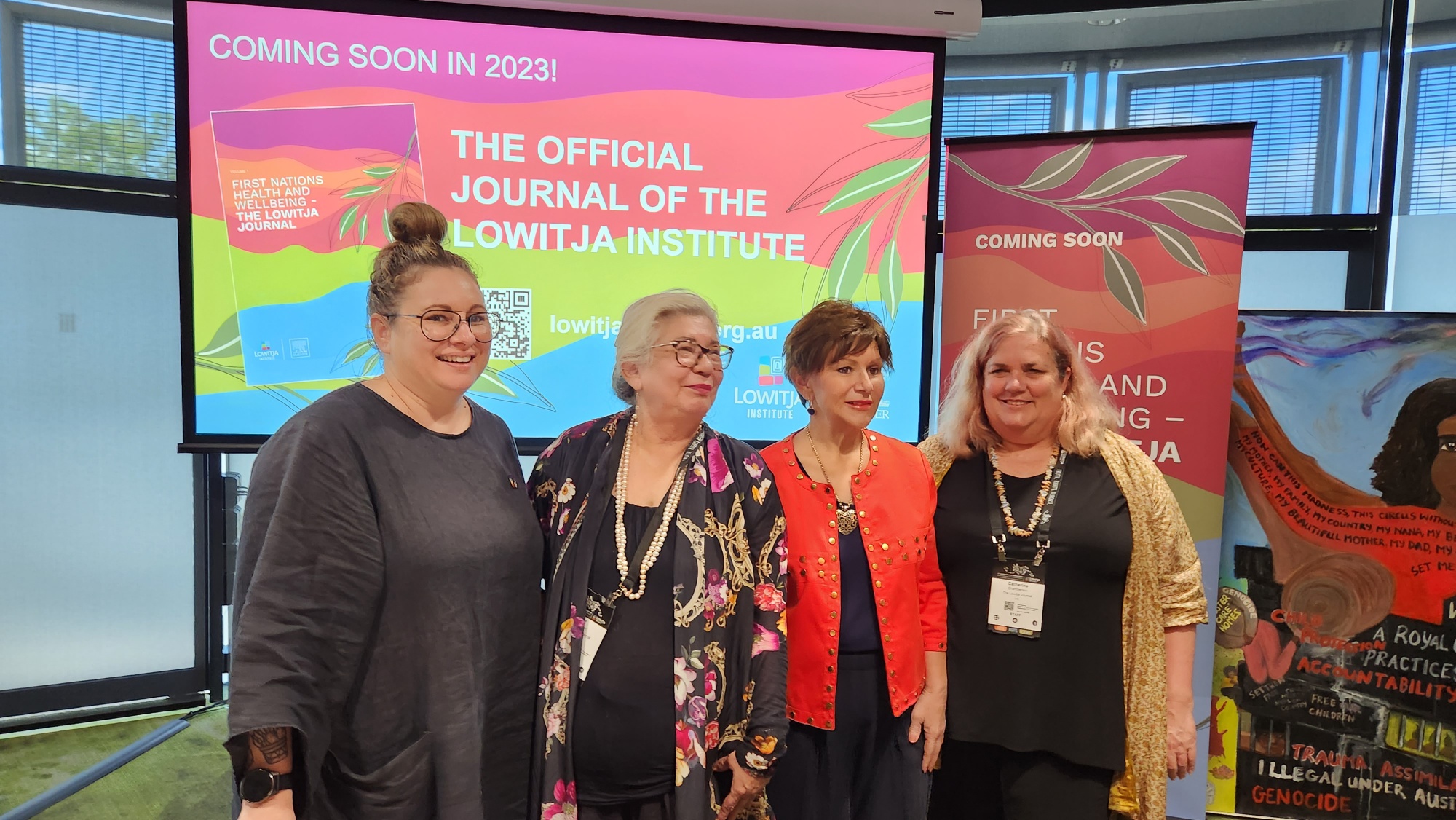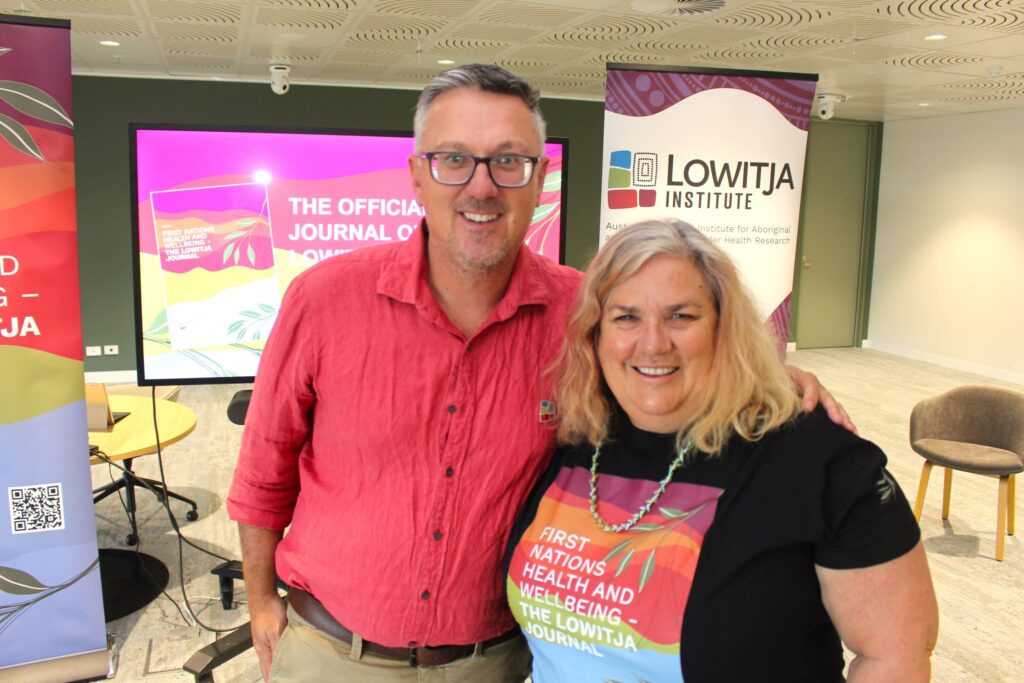The Lowitja Journal is a community-controlled international health and wellbeing journal that aims to uphold First Nations rights to self-determination within research practice.
Establishing First Nations Health and Wellbeing – The Lowitja Journal (The Lowitja Journal) has been an enormous collaborative effort involving the Lowitja Institute Board and staff, Elsevier key staff and a large editorial team of almost 30 First Nations researchers. This article reflects on our shared journey of establishing this unique community-controlled international health research journal.
It was early 2022 when Adjunct Professor Janine Mohamed, then CEO of the Lowitja Institute, came to talk to me about an approach by Elsevier to the Lowitja Institute to establish a community-controlled health research journal. This seemed like an exciting opportunity we should embrace.

(credit: Lowitja Institute).
The first thing I was asked to do was to prepare a proposal for the Lowitja Board, which gave strong support for this journal to be community controlled. I was subsequently invited to take on the role of Editor-in-Chief for this new journal which was a great honour that I readily accepted. This was to be the start of a steep learning curve for me as a Palawa Trawlwoolway midwife with a background in public health research.
We established weekly meetings with a core team including the then Lowitja deputy CEO Paul Stewart, Elsevier staff Diana Jones and Fiona Barron, and myself. These weekly meetings continue, now including Managing Editor Scott McLennan and research/editorial assistants Kristy Meiselbach and Amali Andrews, after more than two years. We still have a full agenda of actions arising from the process of establishing the Lowitja Journal so the work is far from completed.
The second major task we undertook was to establish an editorial team of senior and associate editors. We tried to search broadly for experienced researchers, and for the senior editorial team we particularly sought breadth of expertise and research methods. As this is an international journal we sought international expertise, but we currently have higher representation from Australia which reflects the strong local community networks and affiliations with the Lowitja Institute.
The third major task was development of the author guidelines, which built on the original proposal to the board. We had a mandate from the Lowitja Board and editorial team to be bold and true to principles of decolonising research. Our Aims and Scope are broad and focus on “all aspects of science, culture, philosophy and practice regarding the health and wellbeing of First Nations community”.
We recognised that there is a current bias in health research, with much of the current evidence about First Nations people generated predominantly by non-Indigenous researchers writing about us. We wanted to use this unique opportunity to recentre the voices of First Nations communities in research about us. Hence one requirement of the Lowitja Journal is that all submissions must have substantive contributions by First Nations people, with the first, second or senior (last) author being listed and identified as First Nations.
We also require that all authors refer to the CONSIDER statement in their articles to strengthen reporting of health research involving First Nations people. We are currently in the process of trialling a requirement for authors to complete a CONSIDER statement noting where each aspect has been addressed in the manuscript, to assist reviewers.
Our guidelines also include advice about attributing First Nations knowledge, including oral teachings, to ensure that prior to publication in the Lowitja Journal the source of knowledges is correctly attributed to the communities and community members who have been custodians of that knowledge.
Other aspects of the author guidelines that are designed to increase inclusion of First Nations research are the current waiving of any publication fees, generous word counts to allow descriptions of culturally appropriate research methods, and a broad range of manuscript format options which include original research, reviews, short communications and commentaries, research notes on Indigenous methodologies, research translation papers, and short communications such as letters, book reviews, personal reflections and practise case studies.

We put out our first call for papers in mid-2022, asking for potential authors to consider lessons from the COVID-19 pandemic. We were delighted to receive many papers related to COVID-19 and other topics too. The Lowitja Institute employed a managing editor and the editorial team set to work to invite reviewers and make decisions on manuscripts. This has not been an easy task and we are very aware of the competing demands on time for editors and reviewers. We are very grateful for the time they have contributed, which was instrumental in the successful ‘soft’ launch of the first issue in late 2023 and formal launch in February 2024.
We continue to receive regular submissions to the Lowitja Journal, and our growing editorial team continues to work hard to find reviewers and make decisions on manuscripts for the second issue. We have been grateful for the Lancet editorial team’s support in helping us establish our processes. We endeavour to find ways we can support First Nations authors to publish high quality research, including through our regular webinar series. We held a webinar in 2024 about ‘spoken word essays’ to encourage potential authors to think broadly about how research can be published to enable community involvement. We continue to take on board feedback from authors, reviewers and editors to refine the Lowitja Journal processes to best meet the needs of communities and authors. As stated in our first issue editorial, it is time for a First Nations renaissance in health research, and the Lowitja Journal has an important role in leading the way.
Professor Catherine Chamberlain is a Palawa woman from the Trawlwoolway clan (Tasmania), National Health and Medical Research Council (NHMRC) Leadership Fellowship (2024-2028) and Head of the Indigenous Health Equity Unit in the Melbourne School of Population and Global Health, The University of Melbourne.
The statements or opinions expressed in this article reflect the views of the authors and do not necessarily represent the official policy of the AMA, the MJA or InSight+ unless so stated.
Subscribe to the free InSight+ weekly newsletter here. It is available to all readers, not just registered medical practitioners.
If you would like to submit an article for consideration, send a Word version to mjainsight-editor@ampco.com.au.

 more_vert
more_vert